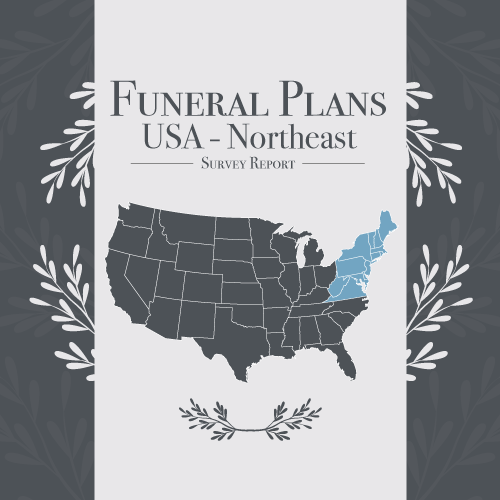Funeral Planning in the Northeast United States: New Survey Research Findings
New study suggests disparities between expectation vs. reality when it comes to costs.

In January 2019, Beyond the Dash conducted a survey of adults living in the Northeast United States. We wanted more insight into the values people hold in regards to death, funeral planning, memorialization and living their dash to the fullest. We asked questions about five topics:
- Funeral Budget
- Funeral Arrangements
- Advance Planning
- Obituaries
- Bucket Lists
Many answers were along the lines of what you might expect. For example, respondents over the age of 55 had, on average, more funeral plans pre-arranged than those under age 55. But other findings weren't so predictable. For example, over 16% of respondents expect to pay less than $500 for funeral arrangements, despite the average cost of a funeral being over $7,000.
Interestingly, some respondents struggled to answer certain questions pertaining to their own end-of-life plans—many of them saying that thinking about funerals was "too morbid."
1. Funeral Budget
When it came to paying for funeral arrangements:
- 16.5% said their budget was $0 – $500.
- 12.5% said their budget was $500 – $2,000.
- 28.2% said their budget was $2,000 – $5,000.
- 31% said their budget was $5,000 – $10,000.
- 11.8% said their budget was more than $10,000.
The average cost of a funeral in the United States is between $7,000 and $10,000. Most funeral homes offer affordable direct cremation packages, which can run as low as $500, but tend to be closer to the $1,000 mark. When people plan funerals that include burial, embalming, a permanent monument, a newspaper obituary and any personalizations, costs can easily exceed $10,000 or $15,000.
People aged 55 years and older tended to be more willing to pay more than $10,000 total for their funeral arrangements, and those aged 18 to 34 were the least. These results make sense: People who are nearing the end of their life are more likely to have greater savings, established careers, and they also may view pre-planned funeral arrangements as more practical than when they were younger.
Surprisingly, respondents in the youngest age category didn’t have the smallest potential budgets. Those aged 35 to 54 were the most likely to expect to pay for funeral arrangements with a budget of $500 or less.
Those in the 18 to 34 age category were most likely to opt for a modest, but realistically priced, funeral of $2,000 to $5,000.
Here is a breakdown of funeral budget by age:

Most people care more about budget than funeral arrangements.
One of the most interesting findings of the study was that, despite most people having a specific idea of what they would like for their funerals, many would rather change their plans than go over budget. In fact, more than 71% of all respondents said that if their wishes caused their end-of-life plans to exceed their initial budget, they'd compromise on the funeral plans rather than increase their budget.
Christina Andreola, owner of New Narrative Memorials, says there are two things to keep in mind when contemplating advance funeral planning:
-
"Despite what some people think, it's just not possible to take care of a body without any cost incurred, which makes planning in advance so much more important! Ultimately, if it's not you setting aside any money to help pay for the funeral, the cost will be passed on to someone."
-
"There are quite a few 'other' expenses that don't have to do with a body disposition that always surprise people - for example, death certificates cost money, cancelling certain plans and policies, obtaining copies of certain documents."
2. Funeral Arrangements
The type of memorial service a person will have depends on many factors. Budget, as mentioned, is one of the most important determining factors in the kinds of services a person will plan for their death. Religious and cultural customs also come into play when folks are deciding what a funeral should like like.
What is the most popular kind of funeral in the Northeast region?
There are many choices to make when planning a funeral. Some people prefer to host a traditional funeral, usually conducted with the body present. This may or may not include a visitation ceremony or graveside service. When a person's body is not physically present at the service, a family may opt for a memorial service, as often happens in cases of cremation. For those who reject the concept of a religious funeral, or mournful memorial service, there is also the option of hosting a celebration of life. Some people want something more creative than a traditional ceremony, like a party or a picnic in their honor. And still others prefer not to be memorialized in a formal ceremony at all.
With all these options available for saying goodbye to a loved one who has passed, we asked respondents what they would want for their own memorialization.
Over 23% of respondents want a traditional funeral service. Celebration of life was a close second favorite, with over 20% of respondents hoping for a more upbeat kind of service. Other results showed that:
- 18% wanted a memorial.
- 14.5% wanted an open casket viewing.
- 9.3% wanted a graveside service.
- 13.3% wanted no funeral.
Of those who indicated Other, answers included wanting their "ashes sprinkled in the sea, with no ceremony," and "a combination of ceremony of life and memorial service."
Here is a breakdown of funeral service preferences by age:

How do people want their remains to be handled after they die?
Many have claimed that cremation is is on the rise, rapidly replacing traditional burial as the most popular choice for disposing of a corpse. We wanted to find out if this was true. If so, what does the future of undertaking and memorialization look like?
Cremation is the preferred method of handing remains.
Of those who participated in the survey, a resounding 47.2% preferred cremation over other options, including traditional burial, natural burial and biocremation. Here is the breakdown of remains preferences in the Northeast:

Of the 3.2% who selected Other, a popular alternative to traditional handling of remains was to be donated to science for research. Other (more colorful) answers included mummification, cryogenic freezing, above-ground casket burial, and taxidermy.
To some, it can be difficult to understand why anyone would want to be embalmed, or see their relatives' bodies after they are dead. We asked funeral industry leaders what they think about funeral arrangements that include open caskets and visitation ceremonies.
According to Christina Andreola, a viewing can actually be a healthy step toward closure:
"I've heard from many wise directors and end-of-life doulas who encourage a viewing after death (and in some cases, a home funeral). These end-of-life rituals are important and can have a profound effect on the healing journey."
3. Advance Planning
Pre-planning funeral arrangements is a way of ensuring your final wishes are carried out when you are gone. Most funeral directors offer this service, and allow people to pay in advance.
When asked, "What do you think of planning your own funeral?" respondents used an open form field to share their thoughts on the process of pre-planning arrangements for the end of their life.
Respondents' sentiments toward pre-planning fell into three categories:
-
Positive (60%)
Most people believe that pre-planning is a necessary step to take in order to have control over arrangements, as well as to ensure that their families are taken care of.
-
Negative (30%)
People in this group said thinking about their own death was too morbid, or that something else should handle their funeral arrangements.
-
Neutral (10%)
People who didn't have an opinion one way or another about pre-planning indicated they didn't care about their arrangements. After all, they'll be dead.
People like the idea of pre-planning their funeral arrangements. But do their plans match their values?
With 60% of people feeling good about the idea of pre-planning, how many people actually have funeral plans made?
Not many. About 21% about respondents said they had enacted any amount of funeral plans, with over 78% saying they hadn't begun any planning.
Many people believe that as long as they have a legal will written and safely stored, there is no need to pre-plan funeral arrangements. This belief allows folks to feel some peace of mind.
"Death can be a stressful, disturbing, and very uncomfortable subject if you let your thoughts run wild for long enough. Eventually, even the most death positive advocates could find something that completely disturbs them. By starting to discuss this natural process early (and often), we can at least come to terms with our eventual mortality. It doesn't have to be 100% acceptance all at once, but slow steps are much better than nothing at all."
— Christina Andreola, New Narrative Memorials
So, how many people have a legal will prepared to be enacted in the event of death?
Again, not many:
- Only 32% of respondents have a will prepared.
- 68% of respondents have no will prepared.

Older people tended to be more prepared, however. Respondents in older age categories were more likely to have wills prepared than their younger counterparts.
4. Obituaries
Are obituaries dying out? Not by a long shot.
Writing an obituary notice to honor the life of someone who has passed is a foreign concept to many. A published notice advising readers of the death of a community member is a time-honored tradition for families wishing to honor a loved one. With the ability to publish information at the click of a button, it's important to ask if the traditional obituary format of telling life stories is going by the wayside.
As a provider of free online obituary services, Beyond the Dash is happy to report that 72% of people still want obituaries as part of their own memorialization plan when they pass away:

Of the 2% who chose "Other," respondents indicated they were undecided, or hoped loved ones would pay tribute to them less formally.
72% want an obit, but do their desires match their budget?
There are several factors that affect the cost of an obituary, including:
- Whether the story is published in print or online
- The publication's reach
- The length of the story
- Whether a photo is included with the story
Newspaper print obituary prices are sometimes higher than expected. In fact, publishing a short obituary in the local newspaper can easily cost between $300 to $500, or more if there is a photo. However, print newspaper obits aren't the only option for storytellers nowadays. Some community papers offer free basic death notices. There are many obituary websites that provide affordable online obituaries, and some that even publish stories of the deceased for free. Also available to anyone with an account is also the ability to post an obituary story on social media.
So, when deciding what's a realistic and fair price for an obituary, it's important to first determine how people intend to publish obituaries. We asked adults in the Northeast, "What is the best place to publish an obituary?"
Much of modern life is online, but many people still want printed obits.
Close to half of respondents said they wanted their obituary published both in print and online, and over 22% said their story should be published in print only.
Even though most would like obituaries published in print, 74% of respondents expect to pay less than $300.
This is the breakdown of obituary cost expectations across all surveyed:

5. Bucket Lists
Beyond the Dash seeks to share, remember and celebrate life stories. Because we want everyone to live their dashes to the fullest, we asked respondents this final question:
"What are the top 3 things on your Bucket List. That is, what would you like to personally accomplish before you die?"
From "winning an eating contest" to "seeing a balloon festival" to "attending an anime convention" — it's safe to say the answers we received were varied. Although 15% indicated all they wanted was stability (a family, home and reliable job), most bucket list items showed that people are generally more more excited about their life goals than they are about how they will be honored when they are gone.
Answers generally fell into one of these categories:
-
Travel (32%)
"Take a trip around Europe Take a trip to every state in the United States See a baseball game at every major league park."
-
Stability (15%)
"I would like to have the mortgage paid and house fully renovated. I would like to regain my health."
-
Activities (13.5%)
"Eat a Deep dish pizza from Chicago."
-
I don't know (11%)
"Nothing at all."
-
Accomplishments (10%)
"Start a foundation to help fund the monies for folks to be able to care for retired racehorses and greyhounds who can no longer race or be abused for profit."
-
Family (9.5%)
"Make up with my brother."
-
Financial (5.5%)
"Get a Pontiac GTO 1969."
-
Religion (1.5%)
"Obey everything God's calling me to, tell people about Christ and what He's done, love and grow my family."
-
Sex (1%)
"I'd like to have sex with a celebrity."
-
My bucket list is complete (1%)
The 5 most popular places to travel to before you kick the bucket
Travel was the most popular bucket list goal, with nearly one-third of respondents yearning for more travel before they died. We ranked the Northeast's top 5 most popular places to visit before you die:
- Hawaii
- Europe
- Disneyland
- Italy
- Grand Canyon
What to take away
These are the responses of 600 surveyed residents of the Northeast region of the United States. This glimpse into funeral trends might vary with a larger sample of respondents. However, this research aligns with many of the findings of those who work in the funeral industry who report similar findings more anecdotally.
"This report provides important baseline data on views around people's inevitable death and dying."
— Reena Lazar and Michelle Pante of Willow End-of-Life Planning and Education
These results also point to trends that may come as no surprise to those in the funeral industry:
- Cremation has become the most popular method of handling remains.
- Funeral is the most popular type of service at end of life.
- Most people expect to spend between between $2,000 and $10,000 for their funerals.
- 71% of people would prefer to reduce their funeral plans than go over budget.
- Travel is the most popular type of Bucket List goal.
Want more funeral trend data? Beyond the Dash will be conducting studies in the West, Midwest and South regions later in 2019—stay tuned for our next report in June of 2019!
If you are in the funeral industry and would like to be involved in one of our upcoming survey research reports, email us at hello@beyondthedash.com.



